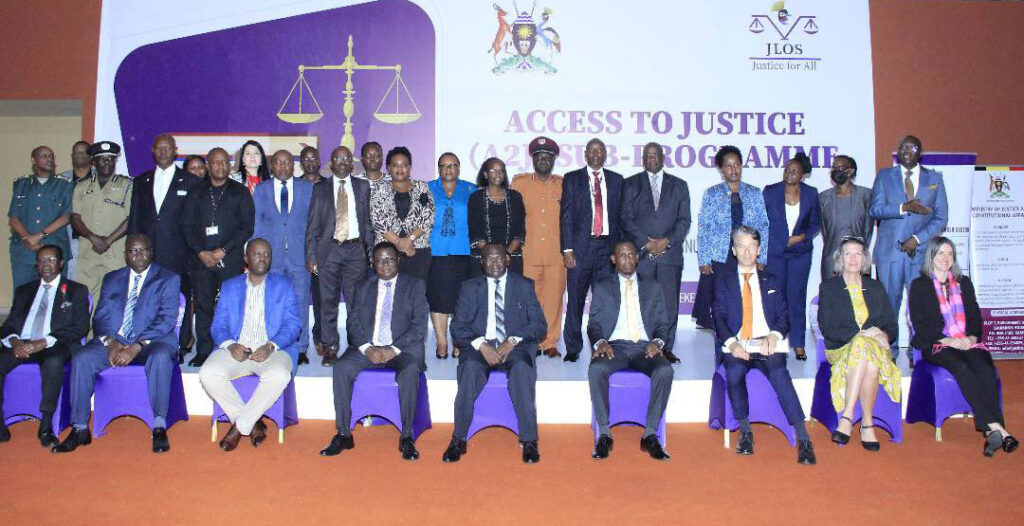
Chair Details
NAME: Nicolas Gonze
ORGANISATION: European Union
EMAIL: Nicolas.GONZE@eeas.europa.eu
Co Chair Details
NAME: Paul Otim-Okello
ORGANISATION: European Union
EMAIL: Paul.OTIM-OKELLO@eeas.europa.eu
Key DPG messages/Priorities
These priorities are meant to focus our work as DPG on specific areas that represent particular challenges in the JLOS sector. We will give particular attention to them in our semi-annual and annual assessments and in our interactions with JLOS and the individual institutions. Once the priorities are agreed upon, the next step will be the drafting of particular messages that we (and our agencies) can use in our policy dialogue throughout the year.
- PRE-TRIAL DETENTION
At police level: After arrest by the police, detainees can – according to the Ugandan constitution [Art 23 (4)] – be held for a maximum of 48-hours in a police cell before being produced at court where the charges against the accused are being read out and from where the accused is being remanded to a prison (this is the norm) or released on bail (which is the exception). This timeline is frequently not being adhered to and there is no data showing the percentage of suspects that are being detained beyond 48 hours. One would have to visit each police station, peruse the lock-up register and calculate the days to access this information. Furthermore, sensitization is needed on questions such as: Do the weekends count as part of the 48-hours? If so, are people in fact being released on police bond during the weekends? Does the time that a suspect was held at a police post (before being transferred to a police station) count as part of the 48-hours and where is the time spent at the post being recorded? Lawyers and courts have become complacent in raising the violation of the 48-hour-rule during a court trial.
At prison level: The number of prisoners on remand (who have not yet gone through a trial and were not yet convicted or acquitted) make up for approximately half of all prison inmates (currently with an all-time low of 46%). This is part of the congestion problem in Uganda, where prisons have a holding capacity for approximately 20.000 prisoners but are currently holding 62.000 prisoners. Some prisoners wait for several years before their trial takes off. This is also linked to the fact the there are not enough Judges to deal with the high number of cases, especially at the High Court Level. The maximum periods on remand are 2 months for petty offenders and six months for capital offenders. However, when a capital offender is “committed” to the High Court (= when the prosecution officially declares that investigations are complete) the six-month-period is not applicable anymore and there is no maximum timeline to be adhered to between the committal and the actual start of the trial. This is the reason why some prisoners have “legally” waited for several years for their trials to start.
- CASE BACKLOG ELIMINATION
The reduction of case backlog along the chain of justice, i.e. from police to prosecution to the courts and the prisons will have a considerable impact on increasing access to justice in terms of timeliness and predictability. With the establishment of the Case Backlog Reduction Committee which is chaired by a Judge of the Supreme Court, some considerable progress has been made. However, there is need to move away from the objective of simply reducing the backlog towards making the elimination of the backlog a key priority. This would also allow for performance assessment measures for judicial officers to be implemented in a meaningful way. The caseload in Ugandan courts currently stands at approximately 144,000 cases, with 32,500 being officially backlogged (= older than two years).
- OTHER ISSUES OF PARTICULAR CONCERN
- Development of service delivery standards
- SGBV
- Justice for Children
Objectives
The purpose of this Group is to serve as the forum for policy dialogue with GoU and other partners on JLOS matters with a view to strengthening the partnership. This includes coordinated dialogue on and support to the effective and efficient implementation of the JLOS SIP II objectives. In order to achieve this purpose, the Group will:
(a) Strengthen GoU/development partners’ partnership through interaction with the JLOS Secretariat, the Steering and Technical Committees and JLOS institutions
(b) Participation in the JLOS reviews and the National Justice Forum, agree with the sector on undertakings in line with SIPIII and NDP, and monitor progress against these undertakings.
(c) Channel financial and human resources to the GoU, civil society and the private sector in support of JLOS priority implementation areas, as contained in the JLOS SIP II;
(d) Monitor JLOS implementation through institutional and field visits, ongoing interaction with the institutions, research utilisation, engagement with civil society and the private sector, consideration of narrative and financial reports;
(e) Eliminate and avoid duplication of and promote coherence and consistency in activities and support through sharing information with each other and JLOS as a whole about current and intended activities and disbursements, abiding by the structures in place and maintaining the partnership principles;
(f) Meet regularly (on a monthly basis) to decide on a coherent view and approach on issues arising in the implementation of SIP III;
(g) Follow up on pertinent issues arising in related development partner groups, interact with these groups and provide input to development partners’ dialogue with GoU including through the Local Development Partners Group;
(h) Minimise transaction costs incurred by GoU in JLOS implementation, amongst others by giving due consideration at a sectoral level to the Uganda Joint Assistance Strategy (UJAS);
(i) Engage in discussions on the NDP, including its annual implementation review, and in discussions on the preparations of SIPIII;
(j) Engage in the budget process and the Public Expenditure Review (PER) and interact with the Ministry of Finance, Planning and Economic Development;
